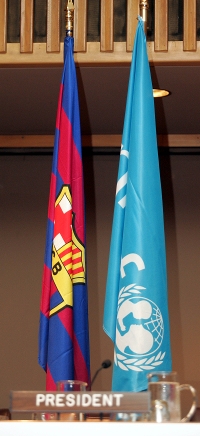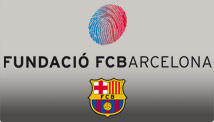FCBARCELONA.CAT
Main menu
Content menu
News article on: UNICEF

Swaziland 2007
WHY SWAZILAND?
• Swaziland is the worst affected country in the world by HIV/AIDS, where more than half
of the pregnant women are affected by the virus.
• Mortality among children under 5 has doubled due to AIDS, a major setback to the
efforts of more than 30 years.
• Unicef is developing more than 30 other programmes in the country and knows the best
mechanisms for actions and collaboration.
• Unicef has recommended that this should be the country where their alliance with the
Foundation and FC Barcelona should concentrate in its first year.
• A 'National Strategic Plan for the Fight against HIV/AIDS’ has been signed
between the Government and Unicef for 2006-2010, where the priorities and lines of action for
combating the disease are clearly set out.
• Because the contribution made by the Foundation and FC Barcelona could “make a
difference” and show that with the proper, sustained resources the whole country can spread
AIDS control programmes to the rural and difficult to access regions.
OBJECTIVES OF THE PROGRAMME IN SWAZILAND:
The Programme to be carried out in Swaziland is based on the ‘'National Strategic Plan
for the Fight against HIV/AIDS’ of 2006-2010 signed by the Government of Swaziland and
Unicef, to specifically benefit the most vulnerable communities, women and children. The
Foundation, within the already nationally established plan, will be working on what are known as
the 4 P’s:
•
Prevention of infection: work with children and adolescents at risk of social
exclusion, to give them the support they need to be able to escape the vicious circle of poverty
and marginality they are in, learning the right skills to make progress, and with a special
emphasis on teaching girls about safe sex with their partners.
•
Prevention of mother-child transmission: contributing to providing national and
decentralised information to pregnant women so that they know where they stand with respect to HIV,
and the measures and treatments that can reduce the risk of passing the virus on to their babies.
•
Paediatric treatment: boys and girls have until now been the “hidden
face” of the epidemic. Progress has gradually been made in providing access to antiretroviral
treatment for adults. It is estimated that less than 7% of people needing treatment are getting it,
but it is the situation with little children that is most worrying. There is a lack of proper
paediatric training, a lack of alternatives when the basic medicines don’t work, a lack of
interest shown by pharmaceutical companies in developing products for children in poor countries
given that they are unable to pay for them, and there is a problem with patents, copyright and
generic medicines that have made paediatric treatment something of a utopia, especially in most
deprived parts of the planet, where most young children are infected. One of the main challenges of
the programme is to expand paediatric antiretroviral treatment and other treatments to rural areas.
•
Protection and support of orphans and other children at risk: Another of the
programme’s main goals will be to provide psycho-social support, access to education, health
care and adequate nutrition to children that are orphaned as a result of AIDS and other children at
risk. Sport, and especially football, will play a major role in this “integrated
programme”, for it is through sport that we want to be able to put smiles back on the faces
of children that have lost the notion of play and leisure, where the fight for survival for some
children who are the heads of families at the age of 12-13 and need to look after their younger
brothers and sisters has meant there is no time left for them to enjoy childhood as they should.
Evaluation:
After the first year of the alliance, the Fundació FC Barcelona will, together with Unicef,
make an exhaustive analysis of the programme and the results achieved over the first period. Work
plans will be drawn up each year and technical and economic analysis reports will be prepared by
Unicef, while experts from the Foundation itself will be visiting regularly to view the progress
made and results achieved. In making each annual plan, the destination and beneficiaries of the
donations will be decided, with particular attention given to the main lines of action of the
Foundation, which include helping the most vulnerable children on the planet that are living in
critical situations and at risk of social exclusion, deprived of all protection and faced by the
viscous circle of poverty and marginality which is only perpetuating the exploitation and abuse to
which they are subjected.

